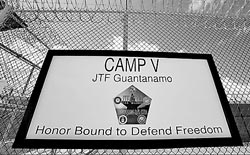
US Supreme Court will consider Guantanamo detainees' challengesWASHINHGTON, Saturday (AP) - The Supreme Court agreed to review whether Guantanamo Bay detainees can use federal courts to challenge their confinement, reversing an April decision not to hear arguments on the issue. The unusual turnabout was announced without comment from justices who had twice before issued rulings critical of the way the Bush administration was handling detainees. Arguments are expected in the fall.
Meanwhile on Friday, Democrats in the House of Representatives said they want to cut President George W. Bush's budget for the prison in half, beating the administration to the punch in shutting down the facility for terror detainees. There was no indication why the justices changed course from three months ago, but lawyers for the prisoners pointed to intervening events as having changed the complexion of the long-running controversy. A week ago, lawyers for the detainees filed a statement with the Supreme Court from a military officer who alleged U.S. military panels that classified detainees as enemy combatants for the past four years relied on vague and incomplete intelligence.Under a law the Bush administration pushed through Congress last year, designating detainees as an enemy combatants strips them of any right to use the federal courts to challenge the legality of their detention. Detainees challenged the law, and their appeal reached the Supreme Court earlier this year. On April 2, the court turned down the detainees' request to be heard. At the time, Justices John Paul Stevens and Anthony Kennedy pointed to the ''obvious importance'' of the cases, but said it would be premature to intervene. Three members of the court said in April they wanted to step in immediately: Justices Stephen Breyer, Ruth Bader Ginsburg and David Souter.Five of the nine justices must agree to take a case that previously has been denied a hearing, according to an authoritative text on the Supreme Court. Court observers pointed to a 60-year-old case as the closest parallel to how the justices' handling of the detainees latest appeal. Currently, 375 detainees are held at Guantanamo Bay. Gordon Johndroe, a spokesman for the National Security Council, said that ''we did not think that court review at this time was necessary, but we are confident in our legal position.'' The operation of Guantanamo Bay has brought global criticism of the Bush administration and condemnation from Democrats in Congress. The White House says Bush has already decided to close the facility and transfer more than 370 terrorism suspects elsewhere. In 2004, the Bush administration hastily created Combatant Status Review Tribunals after the Supreme Court faulted the government for note giving detainees access to courts. On Friday, Washington attorney David Remes said that ''the corrupted CSRT proceedings and the very restrictive government view of what the detainees can do in the lower courts led the justices to conclude that they should take up these issues.''
In June 2006, the justices ruled that a law passed in 2005 to limit detainees access to U.S. courts did not apply to pending cases. After the April turndown, the detainees' legal team asked the court to preserve their cases for review at an undetermined later time. Dismissing the petitions would be ''a profound deprivation'' of the prisoners' right to speedy court review, the lawyers said. A week later, the detainees' lawyers filed a sworn statement from Lt. Col. Stephen Abraham, an Army lawyer who said tribunal members felt pressured to find against the detainee. He said there was ''intensive scrutiny'' and when panelists found that a prisoner was not an enemy combatant they were ordered to reconvene to hear more evidence. |
|| Front
Page | News | Editorial | Columns | Sports | Plus | Financial
Times | International | Mirror | TV
Times | Funday
Times || |
| |
Copyright
2007 Wijeya
Newspapers Ltd.Colombo. Sri Lanka. |
